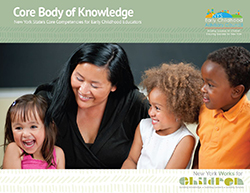Core Body of Knowledge
NY's Core Competencies for Early Childhood Educators
Navigation
Miss Flori at the Sand Table Part 3
Video
Behaviors and Skills
-
4.3.aConsiders whether or not his or her expectations of behavior are appropriate for the age and development of the child
-
4.3.bResponds to challenging behavior in ways that match the child's development
-
4.3.cUses a consistent process of reflection and action to address challenging behavior:
-
4.3.dConsiders other experiences, life circumstances, and whether a child is trying to establish a sense of belonging by exhibiting challenging behavior (i.e., trying to get others to focus on them, hurting others or their things because they feel hurt, etc.) and chooses a response or solution that matches that need
-
4.3.eConsiders what he or she knows about individual children's temperament (i.e., activity level, adaptability, persistence) and responds to challenging behavior in ways that match the children's temperament
-
4.3.fRemains calm and respectful toward the child exhibiting challenging behavior
-
4.3.gAllows natural consequences to guide children's behavior as much as possible
-
4.3.hWhen appropriate, applies logical consequences that are related to the challenging behavior and its function, that are respectful to the child, and that are reasonable
-
4.3.iIntervenes immediately to stop behavior that affects safety and/or ability to learn, including bullying or rejecting others
-
4.3.jMakes sure children understand the connection between behavior and consequence
-
4.3.kWhen a child uses negative behavior, discusses the behavior with the child in private and in the context of expectations based on respect
-
4.3.lTeaches children more effective ways to meet their wants and needs, making the challenging behavior unnecessary
-
4.3.mEncourages children to monitor their own behavior
-
4.3.nFor serious behavior challenges, seeks the assistance of an administrator, psychologist, or behavior specialist to help provide creative and effective interventions
-
4.3.oIdentifies and describes the challenging behavior as a preliminary step in using a Functional Behavioral Assessment (FBA)
-
4.3.pUses FBA to determine the %22function%22 of a challenging behavior (the purpose a challenging behavior serves for the child)
-
4.3.qIdentifies what happens right before (antecedent) and what happens right after (consequence) challenging behavior occurs
-
4.3.rDevelops a behavior intervention plan
-
4.3.sRegularly evaluates behavior intervention plans to make appropriate modifications, accommodations and interventions as necessary
Highlighted items are directly addressed in this resource




